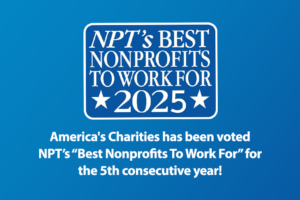America's Charities | April 12, 2021
How Businesses and Employees Can Stand up Together and Stop the Horrific Treatment of Dogs at Puppy Mills
![]() Not all pet stores are bad. More than 3,000 pet stores have partnered through The Humane Society of the United States’ Puppy Friendly Pet Stores program. The vast majority of these 3,000 stores signed a pledge to never sell “commercially raised puppies”, and focus on pet products and services instead. Only a few dozen stores account for all these adoptions. This helps the HSUS crack-down on endless suffering for the dogs involved and leading to adoptions of more than 35,000 local shelter pets instead.
Not all pet stores are bad. More than 3,000 pet stores have partnered through The Humane Society of the United States’ Puppy Friendly Pet Stores program. The vast majority of these 3,000 stores signed a pledge to never sell “commercially raised puppies”, and focus on pet products and services instead. Only a few dozen stores account for all these adoptions. This helps the HSUS crack-down on endless suffering for the dogs involved and leading to adoptions of more than 35,000 local shelter pets instead.
Unfortunately some pet stores still choose to source their puppies from commercial dog breeding operations known as “puppy mills.” Behind the cute, fluffy puppies you see in those store windows is a very shady, cruel industry where dogs are treated horrifically.
Corporate America can be a good and an important ally to animal welfare leaders like the Humane Society of the United States (HSUS) in the fight against all forms of animal cruelty – like puppy mills. In this article, we share some background and facts about puppy mills; highlight the positive results that have come from the HSUS’ work, and outline ways that businesses and their employees can join together to help the HSUS end the cruel treatment of dogs in mass breeding operations.
What Makes Puppy Mills and the Associated Pet Stores Bad

Although all 50 states have anti-cruelty laws, they are seldom applied to puppy mills if the dogs in question have the rudimentary basics of shelter, food and water. Mill dogs are often treated as agricultural “crops” and not as pets, with little concern for their health and well-being.
Puppy mill dogs are often sold to unsuspecting families despite having serious and even fatal health and hereditary conditions such as seizures, neurological conditions, liver disease, parvovirus, distemper, parasites, pneumonia, or skin and ear infections.
The Humane Society of the United States receives complaints from buyers of sick puppies on a daily basis—more than 5,300 in the last 10 years via our online complaint form, email and our puppy mill tip line. We have published the results of 10 years of complaints and stories from consumers who purchased puppy mill dogs. The accounts are heartbreaking and hard to read. And they are far too common.
It’s not unusual for puppies to seem healthy at the time of purchase— deadly diseases and conditions can have weeks-long incubation periods— only to become sick or even die within a few days of arriving in their new home. Some buyers report spending thousands of dollars trying to save the life of a sick puppy, with a few spending more than $10,000 on veterinary care to save the life or ease the suffering of a beloved pet.
What the HSUS is doing to Stop Puppy Mills:
The Humane Society of the United States is leading the fight to end retail sales of puppies, drive inhumane puppy mills out of business, strengthen care standards and oversight of mass breeding operations, and move consumers away from purchasing a pet and toward adoption. More than 35,000 homeless pets have been saved as a result of our Puppy Friendly Pet Stores conversion program, which encourages pet stores to help with homeless pet adoptions rather than selling commercially-raised puppies.
Our Animal Rescue Team has rescued more than 10,000 dogs;
- The Animal Rescue Team deploys to scenes of suspected cruelty and neglect at puppy mills and launches a rescue as soon as law enforcement gives the green light.
- Use the courts to hold retailers and mill operators accountable: Our findings and investigations have triggered multiple consumer lawsuits against retailers and mill owners and shut down dozens of mills and pet stores.
- Change bad federal policy: We got the US Department of Agriculture to crack down on the import of puppies from foreign mills, saving thousands of dogs from transport before they were fully weaned and vaccinated.
- Move customers toward adoption instead of purchases: Our Puppy Friendly Pet Stores program has helped more than 3,000 pet stores pledge not to sell puppies, and led to adoptions of more than 35,000 local shelter pets instead.
Our work on puppy mills has changed the landscape for dogs used in the breeding industry. We have helped pass 380 local ordinances and three state laws that end sales of commercially raised puppies (and other animals) in retail pet stores, carried out multiple undercover investigations that led to the closure of stores and mills, publicized violations and abuses by mill owners from inspection records and data, and run national campaigns that educate consumers about how and why to adopt their next family member from their local shelter or rescue group. In May 2020, the USDA finalized a new rule requiring commercial dog breeders to obtain regular veterinary care and vaccinations for dogs, provide continual fresh water, and to demonstrate compliance with the Animal Welfare Act before obtaining a new license. The rule encompasses several standards that HSUS requested in a 2015 legal petition to the agency and had been pressing the agency to adopt ever since.
How Businesses and Employees Can Help:
Our Stop Puppy Mills campaign exposes inhumane breeding operations and sales in states with high numbers of mills. We investigate suspected cruelty and neglect at pet stores that sell puppies from mills. We collaborate with and assist law enforcement authorities to enforce laws and prosecute offenders, and provide ongoing law enforcement training, tip lines, rewards, and investigations.
We’ve made great progress but much more needs to be done. And a large percentage of your employees and consumers care about what we are doing.
With your support, we will continue to:
- Expose cruel conditions at mills and animal neglect at pet stores
- Reduce the market for puppy mill dogs by restricting or banning retail sales, creating partnerships between pet stores and shelters and moving consumers toward adoption and responsible breeders.
- Enact strong standards of care and higher penalties for violations in the biggest puppy-producing states, reform US Department of Agriculture regulations for commercial dog breeding and ensure vigorous enforcement of oversight laws.
- Save dogs trapped in puppy mills through direct rescues and assistance to law enforcement and other rescue groups
As an employer, you can help us do this through multiple methods:
- Campaign: Hold a workplace giving drive focused on this cause. Many people simply aren’t aware of the cruelty of puppy mills and pet stores that sell dogs. By featuring The Humane Society of the United States in your campaign, you can help the HSUS raise awareness about this growing problem, while providing employees with an easy, secure way to take action. While there are different ways employees can donate through workplace giving, the most popular method is via payroll deduction, which allows employees to have a small amount of money deducted from each paycheck each pay period for a year. For example, a gift of $130 total (just $5 per paycheck for 26 pay periods) will help the HSUS rescue one animal from a puppy mill. This is a perfect example of how an employee can make a larger contribution – and life-saving impact – and pay for it in small, more feasible installments, without losing the tax benefits of charitable giving. And because of this year-round sustained gift, organizations like the HSUS can more strategically use that donation to help protect and save animals. This article highlights a few more ways employee payroll donations can make an impact and help the HSUS protect animals.
- Offer Employees Paid Time Off to Volunteer or Feature Current HSUS Volunteer Opportunities: The importance of workplace volunteering is accelerating –America’s Charities research has shown it is the second most important component of employee engagement programs, and the #1 motivation for workplace donors. As more companies have prioritized corporate volunteering and brought this spirit of innovation to their employee giving programs, they have seen the results: improvements in recruiting and retention, employee satisfaction, leadership and skill development, brand value, innovation, community relationships, employee health, and more. One way your employees can support the HSUS through volunteerism to give them paid time off to be Humane Policy Volunteer Leaders, to get involved with animal protection issues in your state through the HSUS’ ally program, or to feature current volunteer events on your employee volunteer platform by referencing this listing which helps you find opportunities based on location and virtual/at home opportunities.
- Matching gifts and/or volunteer grants: An effective way to further demonstrate your company’s commitment to supporting its employees and amplifying their gifts to the HSUS is to match employee donations or offer to make grants to the HSUS based on how many volunteer hours employees give (known as Dollar for Doers service grants). Matching gifts is one of the top five motivations for workplace donors. In fact, 84% of donors say they’re more likely to donate if a match is offered, and 1 in 3 say they would give a larger gift if matching is applied to their donation.
- In-kind Gifts and Supply Drives: Hold a drive encouraging employees to donate items. The HSUS’ Animal Rescue Team has a hefty list of supply needs that varies based on the deployment. Some common supplies on that list (which is kept updated here) include, crates (airline and metal), pet beds, slip leads, food and treats, medical and preventative supplies, and toys.
- Direct Donation Corporate Grants and Sponsorship: Making a direct donation via grant can help ensure the HSUS’ most urgent needs are meant and sponsoring an HSUS event helps underwrite the costs of the events so that all of the funds raised can go directly to our work. When you sponsor an event, your company will be affiliated with the leader in the fight for all animals. It’s an exciting way to connect with new and current customers in their daily lives and demonstrate your commitment to animal welfare.
Get Resources and Insights Straight To Your Inbox
Explore More Articles
For Fifth Consecutive Year America’s Charities Named ‘Best Nonprofit To Work For’
Washington, D.C. – April 1, 2025 – America’s Charities, the nonprofit that mobilizes the power of giving as a leading provider of volunteering, workplace giving,…
Read ArticleWorkplace Fundraising + Volunteering Summit (April 2nd and 3rd, 2025)
Join us in attending this virtual summit! The America’s Charities team is joining up with other leading voices in the workplace giving space for a…
Read ArticleThe Time to Act is Now
The results of the 2024 National Assessment of Educational Progress (NAEP) are in, and the findings are, in a word, heartbreaking. This assessment serves as…
Read ArticleGet Resources and Insights Straight To Your Inbox
Receive our monthly/bi-monthly newsletter filled with information about causes, nonprofit impact, and topics important for corporate social responsibility and employee engagement professionals, including disaster response, workplace giving, matching gifts, employee assistance funds, volunteering, scholarship award program management, grantmaking, and other philanthropic initiatives.





